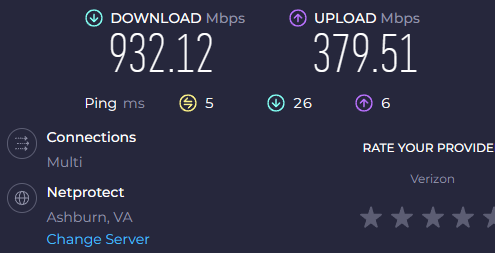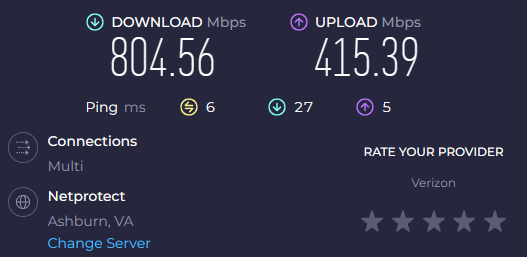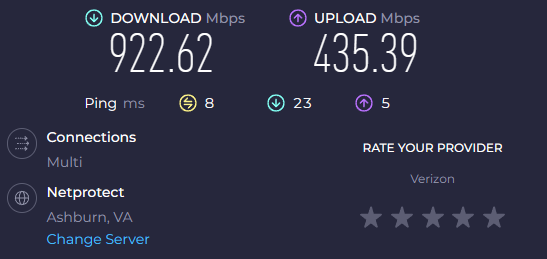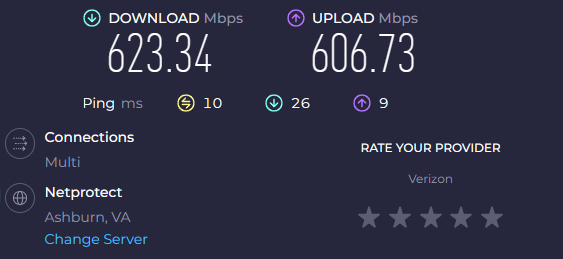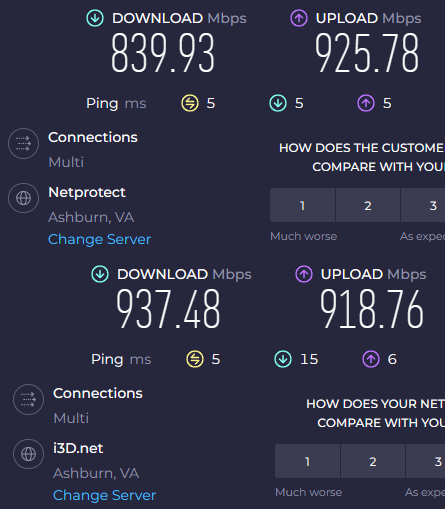This. Just. Sucks. ![]()
I mean: it's useable, and should be enough for smart phone usage most of the time, but at the same time a lot of effort is wasted when the interface runs at 2 Gbit/s and you only get 122 Mbit/s TCP speed.
6% effiency for HE160
20% efficiency for HE80
I would more like to get into the area of 50% TCP throughput when the connection is good, no other users or SSIDs interfere and the router is idling. 500 Mbit/s iperf3 for a 1000 Mbit/s 11ax connection would be nice to have.
Example: I get 545 Mbit/s average over 30 second iperf3 upload test being in direct sight 1 meter away from the router on VHT80, with my 11ac iPhone. Should be around 833 Mbit/s 2 stream most of the time. That's 65% efficiency, not 6% or 20%.
Edit
Your connection seems to be either loaded with other usage or your channel is congested or intefered with other networks. Look at the retransmission counter in your iperf3 table. ![]()
Maybe this is the cause for the low performance in your case. My retransmissions are nearly always zero. Otherwise it's hard to find a cause for low 11ax driver performance when there are lots of low level TCP retransmissions.
Example from just now, the network is loaded with video streams and I am not alone on my VHT80 channel:
iperf3 -c 192.168.1.1 -t 30
Connecting to host 192.168.1.1, port 5201
[ 5] local 192.168.1.150 port 49530 connected to 192.168.1.1 port 5201
[ ID] Interval Transfer Bitrate Retr Cwnd
[ 5] 0.00-1.00 sec 58.1 MBytes 487 Mbits/sec 0 2.00 MBytes
[ 5] 1.00-2.00 sec 62.5 MBytes 524 Mbits/sec 0 2.00 MBytes
[ 5] 2.00-3.00 sec 61.2 MBytes 514 Mbits/sec 0 2.00 MBytes
[ 5] 3.00-4.00 sec 61.2 MBytes 514 Mbits/sec 0 2.00 MBytes
[ 5] 4.00-5.00 sec 60.0 MBytes 503 Mbits/sec 0 2.00 MBytes
[ 5] 5.00-6.00 sec 62.5 MBytes 524 Mbits/sec 0 2.00 MBytes
[ 5] 6.00-7.00 sec 50.0 MBytes 419 Mbits/sec 0 2.00 MBytes
[ 5] 7.00-8.00 sec 58.8 MBytes 493 Mbits/sec 0 2.00 MBytes
[ 5] 8.00-9.00 sec 61.2 MBytes 514 Mbits/sec 0 2.00 MBytes
[ 5] 9.00-10.00 sec 61.2 MBytes 514 Mbits/sec 0 2.00 MBytes
[ 5] 10.00-11.00 sec 57.5 MBytes 482 Mbits/sec 0 2.00 MBytes
[ 5] 11.00-12.00 sec 52.5 MBytes 440 Mbits/sec 0 2.00 MBytes
[ 5] 12.00-13.00 sec 52.5 MBytes 440 Mbits/sec 0 2.00 MBytes
[ 5] 13.00-14.00 sec 61.2 MBytes 514 Mbits/sec 0 2.00 MBytes
[ 5] 14.00-15.00 sec 62.5 MBytes 524 Mbits/sec 0 2.00 MBytes
[ 5] 15.00-16.00 sec 61.2 MBytes 514 Mbits/sec 0 2.00 MBytes
[ 5] 16.00-17.00 sec 62.5 MBytes 524 Mbits/sec 0 2.00 MBytes
[ 5] 17.00-18.00 sec 61.2 MBytes 514 Mbits/sec 0 2.00 MBytes
[ 5] 18.00-19.00 sec 60.0 MBytes 503 Mbits/sec 0 2.00 MBytes
[ 5] 19.00-20.00 sec 60.0 MBytes 503 Mbits/sec 0 2.00 MBytes
[ 5] 20.00-21.00 sec 60.0 MBytes 503 Mbits/sec 0 2.00 MBytes
[ 5] 21.00-22.00 sec 62.5 MBytes 524 Mbits/sec 0 2.00 MBytes
[ 5] 22.00-23.00 sec 48.8 MBytes 409 Mbits/sec 0 2.00 MBytes
[ 5] 23.00-24.00 sec 62.5 MBytes 524 Mbits/sec 0 2.00 MBytes
[ 5] 24.00-25.00 sec 60.0 MBytes 503 Mbits/sec 0 2.00 MBytes
[ 5] 25.00-26.00 sec 43.8 MBytes 367 Mbits/sec 0 2.00 MBytes
[ 5] 26.00-27.00 sec 43.8 MBytes 367 Mbits/sec 0 2.00 MBytes
[ 5] 27.00-28.00 sec 46.2 MBytes 388 Mbits/sec 0 2.00 MBytes
[ 5] 28.00-29.00 sec 46.2 MBytes 388 Mbits/sec 0 2.00 MBytes
[ 5] 29.00-30.00 sec 38.8 MBytes 325 Mbits/sec 135 1.40 MBytes
- - - - - - - - - - - - - - - - - - - - - - - - -
[ ID] Interval Transfer Bitrate Retr
[ 5] 0.00-30.00 sec 1.66 GBytes 476 Mbits/sec 135 sender
[ 5] 0.00-30.08 sec 1.66 GBytes 473 Mbits/sec receiver
135 retransmits in the last second, otherwise zero retransmits. Not around 2000 retransmits as in your case.
